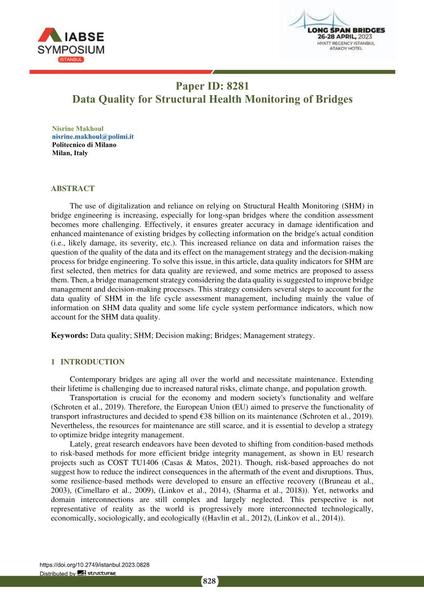Data Quality for Structural Health Monitoring of Bridges

|
|
|||||||||||
Bibliografische Angaben
| Autor(en): |
Nisrine Makhoul
(Politecnico di Milano Milan, Italy)
|
||||
|---|---|---|---|---|---|
| Medium: | Tagungsbeitrag | ||||
| Sprache(n): | Englisch | ||||
| Tagung: | IABSE Symposium: Long Span Bridges, Istanbul, Turkey, 26-28 April 2023 | ||||
| Veröffentlicht in: | IABSE Symposium Istanbul 2023 | ||||
|
|||||
| Seite(n): | 828-834 | ||||
| Anzahl der Seiten (im PDF): | 7 | ||||
| Jahr: | 2023 | ||||
| DOI: | 10.2749/istanbul.2023.0828 | ||||
| Abstrakt: |
The use of digitalization and reliance on relying on Structural Health Monitoring (SHM) in bridge engineering is increasing, especially for long-span bridges where the condition assessment becomes more challenging. Effectively, it ensures greater accuracy in damage identification and enhanced maintenance of existing bridges by collecting information on the bridge's actual condition (i.e., likely damage, its severity, etc.). This increased reliance on data and information raises the question of the quality of the data and its effect on the management strategy and the decision-making process for bridge engineering. To solve this issue, in this article, data quality indicators for SHM are first selected, then metrics for data quality are reviewed, and some metrics are proposed to assess them. Then, a bridge management strategy considering the data quality is suggested to improve bridge management and decision-making processes. This strategy considers several steps to account for the data quality of SHM in the life cycle assessment management, including mainly the value of information on SHM data quality and some life cycle system performance indicators, which now account for the SHM data quality. |
||||
| Stichwörter: |
Brücken Entscheidungsfindung
|
||||
